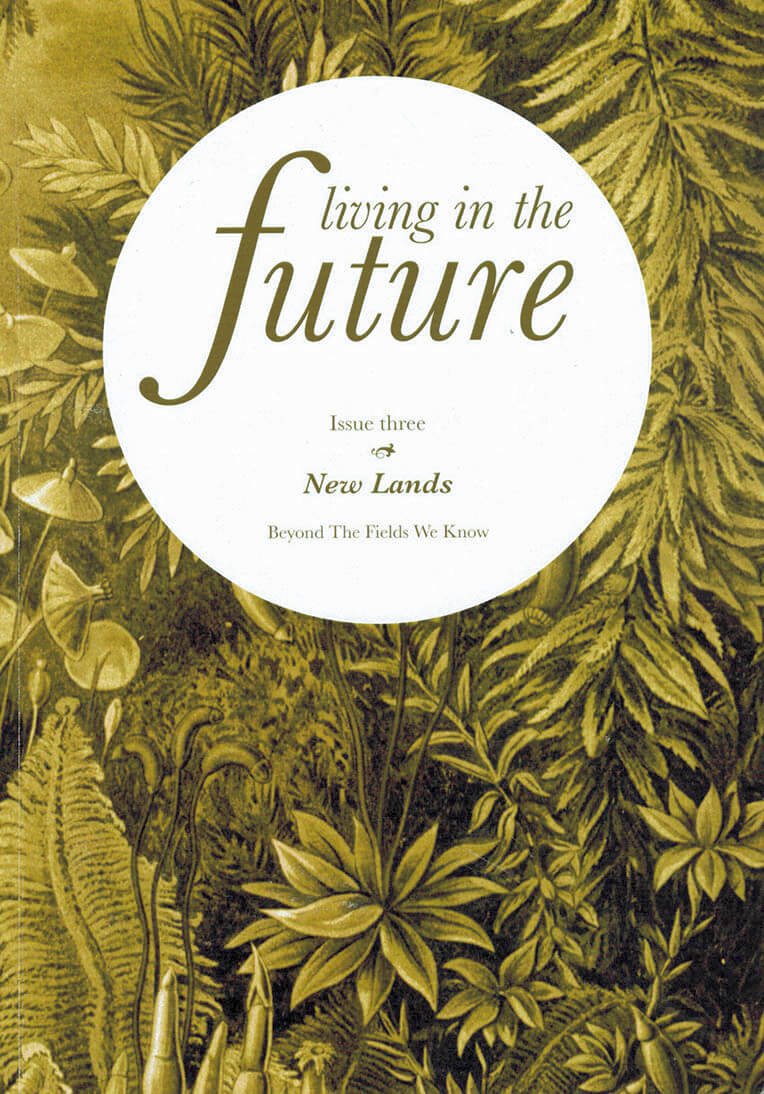Daisy Lafarge
Daisy Lafarge
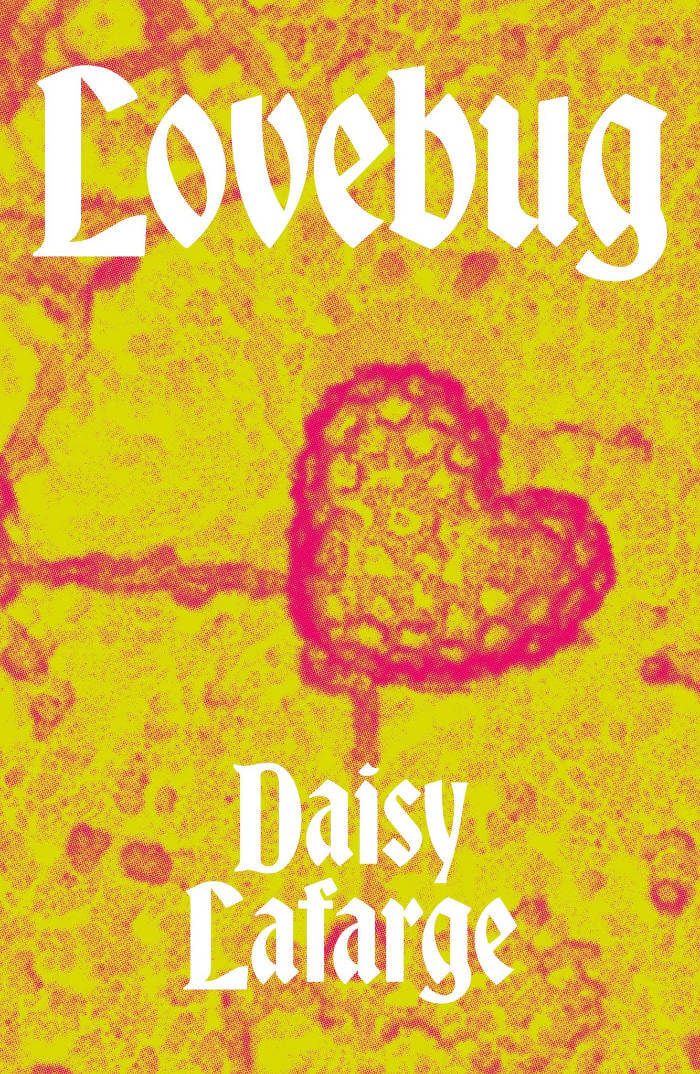
Lovebug
In Lovebug, Daisy Lafarge explores metaphors of love and disease as she seeks to understand human vulnerability and our intimacy with microbial life.
Turning to microbiology, mysticism, and psychoanalysis – as well as the raw materials of love and life – Lafarge navigates the uncomfortable intimacy between the human body and the many bacteria, viruses, and parasites to which it is host.
Lovebug is a book about the poetics of infection, and about how we can learn to live with multispecies ambivalence. How might we forge non-phobic relationships to our ‘little beasts’? How might we rewild our imaginations? In weaving the personal with the pathological, Lovebug complicates the idea of coherent selfhood, revealing life as a site of radical vulnerability and an ongoing negotiation with limit.
"The pathogen arrives anyway and takes a seat at the table. Conditioned to welcome damage, I am curious about this uninvited guest. You must sit down, says Love, and taste my meat".
And more
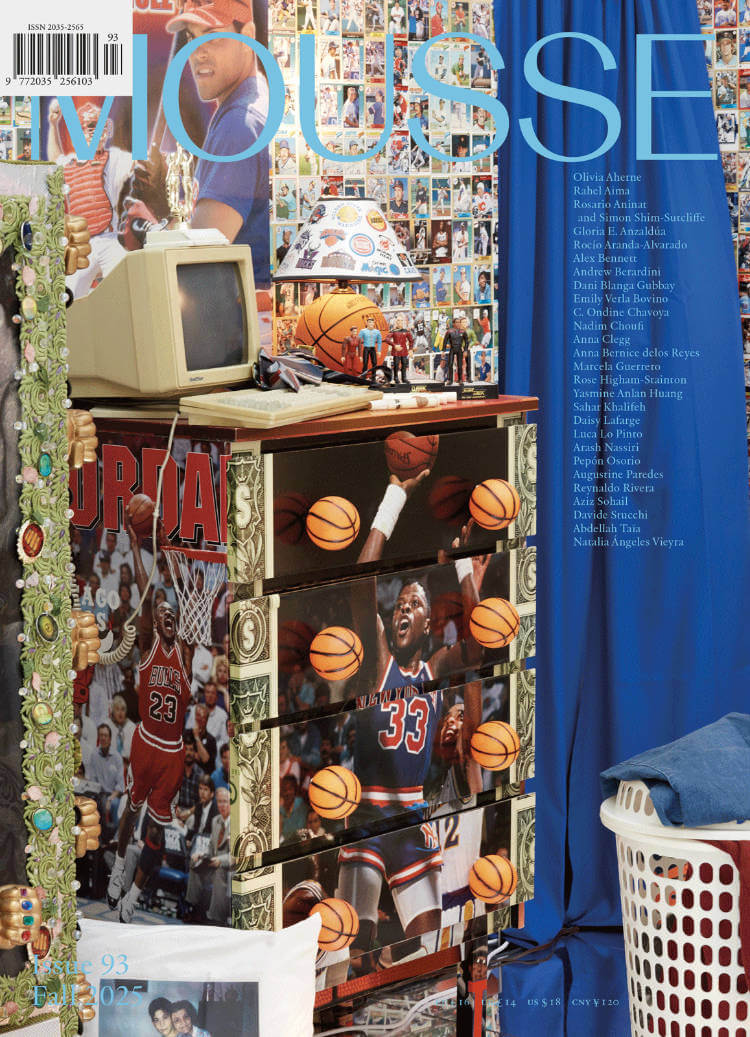
Mousse #93
Andrew Berardini on Artificial Intelligence; Pepón Osorio; Arash Nassiri; Gloria E. Anzaldúa; Marcela Guerrero speaks with C. Ondine Chavoya; Daisy Lafarge; Dani Blanga Gubbay; Davide Stucchi speaks with Alex Bennett; Luca Lo Pinto on Hanuman Editions; Reynaldo Rivera & Abdellah Taïa; Jungle Books...
This issue comes with different covers, randomly distributed.

Spells: 21st Century Occult Poetry
Spells are poems; poetry is spelling.
Spell-poems take us into a realm where words can influence the universe.
Spells brings together over forty contemporary voices exploring the territory where justice, selfhood and the imagination meet the transformative power of the occult. These poems unmake the world around them, so that it might be remade anew.
Kaveh Akbar, Rachael Allen, Nuar Alsadir, Khairani Barokka, Emily Berry, A.K. Blakemore, Jen Calleja, Anthony V. Capildeo, Elinor Cleghorn, CAConrad, Nia Davies, Paige Emery, Livia Franchini, Alexis Pauline Gumbs, Will Harris, Caspar Heinemann, Lucy Ives, Rebecca May Johnson, Bhanu Kapil, Amy Key, Daisy Lafarge, Dorothea Lasky, Francesca Lisette, Canisia Lubrin, Karen McCarthy Woolf, Lucy Mercer, Hoa Nguyen, Precious Okoyomon, Rebecca Perry, Nat Raha, Nisha Ramayya, Ariana Reines, Sophie Robinson, Erica Scourti, Sarah Shin, Himali Singh Soin, Tai Shani, Rebecca Tamás, Bones Tan Jones, Dolly Turing, Jane Yeh, Flora Yin Wong
Introduced by So Mayer
Afterword by Sarah Shin
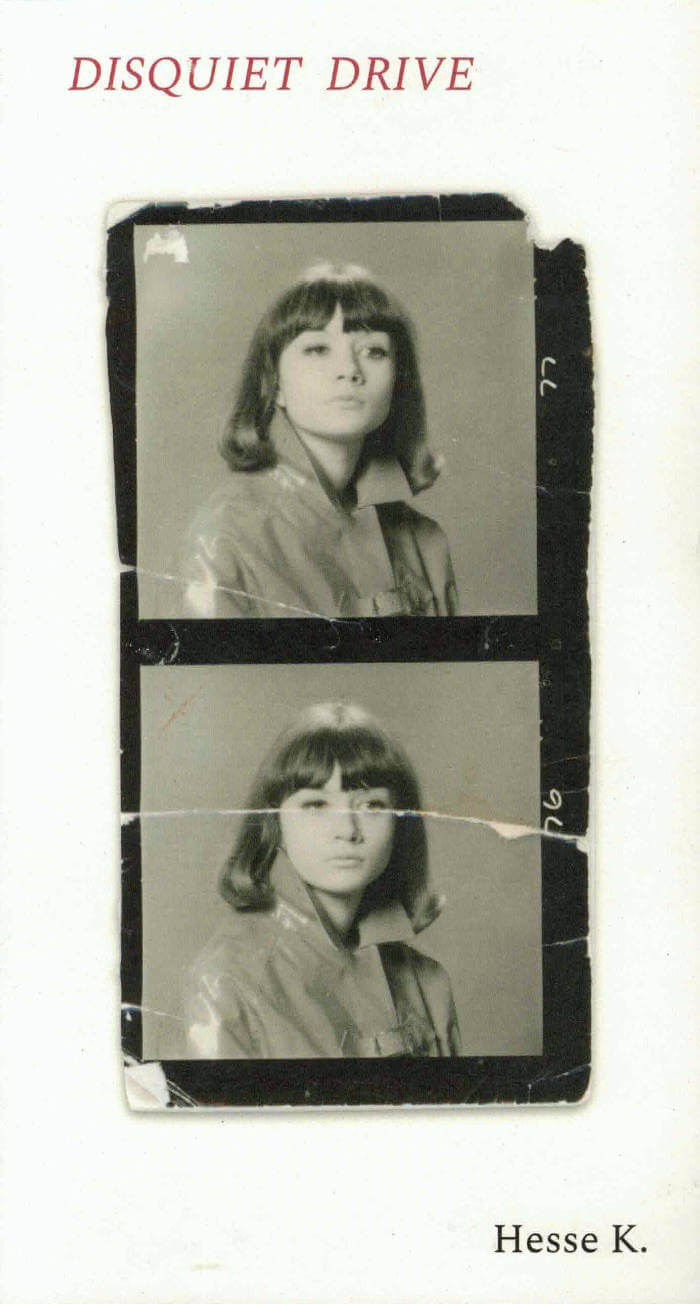
Disquiet Drive
One night a satellite falls out of the sky and splits a girl in half. Disquiet Drive is a book scraped together from the shorn parts of a person who may no longer exist. Beginning with an admission that language and embodiment seem indistinguishable, yet refusing to claim a singular voice, the texts in this collection lurch between the fiery crucible of a transition and the weird jaggedness of our own continuity; between inverted memoir and prose-poetry; the raw, irrepressible lyric and the essay as an exercise in the art of digging-one’s-heels-in. Disquiet Drive is about undoing the words we’re handed so that language can survive, and undoing the body so that it can find a way to live.
'Disquiet Drive is restlessly exquisite. Hesse K’s writing vibrates with the quiet solar intensity of a planetary body that can’t be looked at directly: things slip, slink, snick and lick into each other, limning a gorgeous periphery where genre, past and future selves, follies, fossils and hormones collide. I can’t remember when I last read something as exhilarating, beautiful and deeply attuned to the implications and contradictions involved in struggling towards a bearable world, and the ‘undomesticated sensibility’ it requires of us.' — Daisy Lafarge, author of Lovebug
'Buck wild and entirely unique, Disquiet Drive took me to the beautiful and chaotic edge of the universe and made me want to write (live) for 200 years.' — Eliot Duncan, author of Ponyboy
Hesse K. is a writer. Her criticism and poetry has appeared in MAP magazine and Montez Radio, and in anthologies by Sticky Fingers Publishing, Toothgrinder, Worms and Pilot Press, among others. She lives in London.

Myth Lab: Theories of Plastic Love
Myth Lab: Theories of Plastic Love is a genre-defiant sex-trip to post-human dimensions. If C.G Jung, magic-mushroom shaman Terence McKenna and Camille Paglia (Sexual Personae) had a three-way while binging on George Bataille and undergoing Hormone Replacement Therapy, their baby might be the erotic cocktail of Myth Lab. Its extreme theme is nothing less than the fate of the species.
“Brilliant and wild, Jack Skelley’s Myth Lab is a manifesto of exuberance disguised as a sci-fi sex test-center for the invention of communal futures. Skelley’s a mad scientist, scholar and poet.” - Chris Kraus, author of After Kathy Acker
“In Myth Lab, Jack Skelley adroitly molds an “Einsteinian elasticity between objects and ether” to the “clitoverse.” If this formulation seems too vast, just think about a) the last time you felt good about power and b) all the ways to say yes to pleasure as a source of liberation. In conducting a “cosmologic psychoanalysis,” Myth Lab thrillingly hot wires our neurons to an endless mirror stage reflective of our own instinctual nature.” - Kim Rosenfield, author of Phantom Captain
"An explosion of clit-cock-and-pop-culture worship. Skelley’s eroto-celestial universe fights back not only against the denial of desire – “also known as fuckheadocracy and market forces” – but against death itself." - Francesca Lia Block, author of Weetzie Bat
"A hallucinatory book that straddles gender studies, science-fiction, and cultural criticism (to name but three of many genres). Ever eager to use a newfound Skelley-ism, I urge everyone to read Myth Lab and be “Kardashian'd” with love (i.e buy it now, it's great)." - Susan Finlay, author of The Jacques Lacan Foundation
"In Jack Skelley’s Myth Lab, something weird and beautiful is forged in the crucible of infinite horny grief. It’s an epic, delirious descent into the inferno, navigating the concentric circles of romance and desire as literary malady, TikTok psyop, benevolent cosmological principle, and more. Simultaneously a quest, a physics experiment and an elegy. I loved following its narrator - a tender, erotomanic, Blakean particle - seeking and finding visionary head." - Daisy Lafarge, author of Love Bug

The Ginny Suite
A mysterious global syndrome is affecting women, causing symptoms of submissiveness and aphasia. While the number of sufferers grows, so does our protagonist’s paranoia—of the media, her doctors, and her husband. In the age of misinformation, AI, and surveillance technology, The Ginny Suite asks how much—and who—we’re willing to sacrifice in the name of progress.
The Ginny Suite is formally innovative, a great read. Stacy Skolnik recasts the subject of the internet into telling particulars in her affecting choreography of memes/screens/women/men. — Constance DeJong, author of Modern Love
The Ginny Suite is a perfect hell of a book: a gossipy stylish mystery that’s both petty and profound. I love how its paranoias and insecurities tip lushly into plot: is the lyric condition of poetry a pathology? Is dissociation a radical response to the lived conditions of patriarchy, or is it patriarchy hacking your brain into submission? What if, instead of self-diagnosing through google, your search history was used to diagnose you, and form the basis of covert treatment? Anyone who’s ever suffered the malady of writing poems will recognise The Ginny Suite’s inability to stop picking these scabs. Its prose moves seamlessly from the lush to the blunt, awash with glitching pronouns, horny ennui, sci-fi intrigue and tender girlish digital fantasies—like if the author of Malina had a dormant Neopets account. I adored it. — Daisy Lafarge, author of Lovebug
Perversely brilliant, fearlessly inventive, The Ginny Suite beautifully illustrates the horror of being a thinking person inside of a body and culture rushing toward the graveyard. — Brad Phillips, author of Essays and Fictions
The Ginny Suite proves that Stacy Skolnik is one of the most timely and original voices in post-pandemic New York. — Joshua Citarella, author of Politigram and the Post-left
A Handmaid’s Tale for the Post-Truth-AI-Surveillance Era. — Suzanne Treister, author of Hexen 2.0
Stacy Skolnik is the author of the poetry collection mrsblueeyes123.com (self-released, 2019), the chapbook Sparrows (Belladonna* Collaborative, 2023), the workbook From the Punitive to the Ludic: Prompts for Writing Public Apologies (with Thomas Laprade for Montez Press Radio, KAJE, 2022), and the chapbook Rat Park (with Katie Della-Valle, Montez Press, 2018). She is a co-founder and co-director of Montez Press Radio, the Lower East Side-based broadcast and performance platform. The Ginny Suite is her debut novel.

BRICKS FROM THE KILN #5
Andrew Walsh‐Lister, Matthew Stuart
Bricks from the Kiln is a semi-yearly journal and multifarious publishing platform established in mid-2015 to support critically minded and explorative writing on and around art, design and literature. Edited by Matthew Stuart and Andrew Walsh-Lister, the forthcoming issue, number five, begins with a single sentence:
blankets topologies in glistening snow and blood — produces instructional spattering, again and again — coughs up clotted network diagram hairballs of illegibility — parasitically draws on / from Thomas Browne’s quincunx — meets for The Big ROAR tomorrow, yesterday — lifts loud cows off the page, aloud — flips the coin of language, heads or tails? — politely speaks on writing heard yet seen — twists tongues, transliterates and teases — makes contact with ancestral spirits — traverses the foothills of La Marquesa, past and present — is the Spectre at the feast — (re)traces polymorphous concrete poems — dashes, gestures, speaks, breathes, moves, joyness — is, as ever, tentative, incomplete and inconsistent.
Contributions by Helen Marten, Rebecca May Johnson, Johanna Drucker, Louis Lüthi, Daisy Lafarge, Holly Pester, Ursula K. Le Guin, Quinn Latimer, Stefan Themerson, Slavs and Tatars, Ashanti Harris, Catalina Barroso-Luque, Kevin Lotery, Bronac Ferran with Greg Thomas and Astrid Seme with Alex Balgiu.
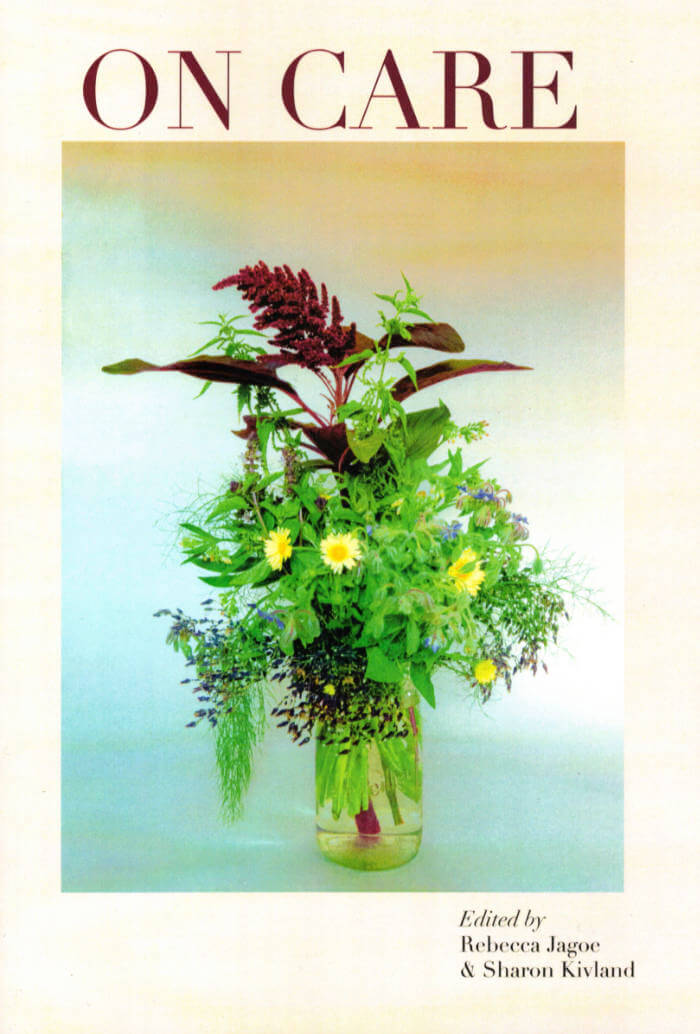
On Care
Care is a matter of responsibility for human and nonhuman allies, an ecological network. Care is an imperative, and acting with care approaches the world beyond selfhood. ON CARE, an aggregate of voices, discusses the politics of caring, support, and the role of welfare in an increasingly neoliberal society. It questions who is seen as worthy of care, whose narratives are given attention, and whose lives are overlooked in a complex web of assemblages: conceptions of medical authority, the co-option of self-care in political rhetoric, care as a commodity in the hospitality industry, intergenerational intimacy, sexecology; care as utopian and care as transactional. ON CARE maps a constellation of perspectives, as testaments, fictions, and essays, addressing the relation between good health, interdependence, and the ethics of (self)care.
Contributors: Tom Allen, Uma Breakdown, Alice Butler, Oisín Byrne, Julia Calver, Jamie Crewe, Juliette Desorgues, Rachel Genn, Laura Godfrey-Isaacs, Laura González, Holly Graham, Helen Hester, Justin Hogg, Juliet Jacques, Mati Jhurry & Rebecca Jagoe, Juliet Johnson, Sophie Jung, Daisy Lafarge, Elisabeth Lebovici, Rebecca Lennon, Rona Lorimer, Katharina Ludwig, Mira Mattar, Martina Mullaney, Cinzia Mutigli, Carolina Ongaro, Molly Palmer, Roy Claire Potter, Nat Raha, Helena Reckitt, Ruiz Stephinson, Erica Scourti, Victoria Sin, Himali Singh Soin & Tyler Rai, Miguel Soto Karlovic, Isabella Streffen, Jamie Sutcliffe, Maija Timonen, Lynn Turner, Rosa-Johan Uddoh, Daniella Valz Gen, Nina Wakeford, Alberta Whittle
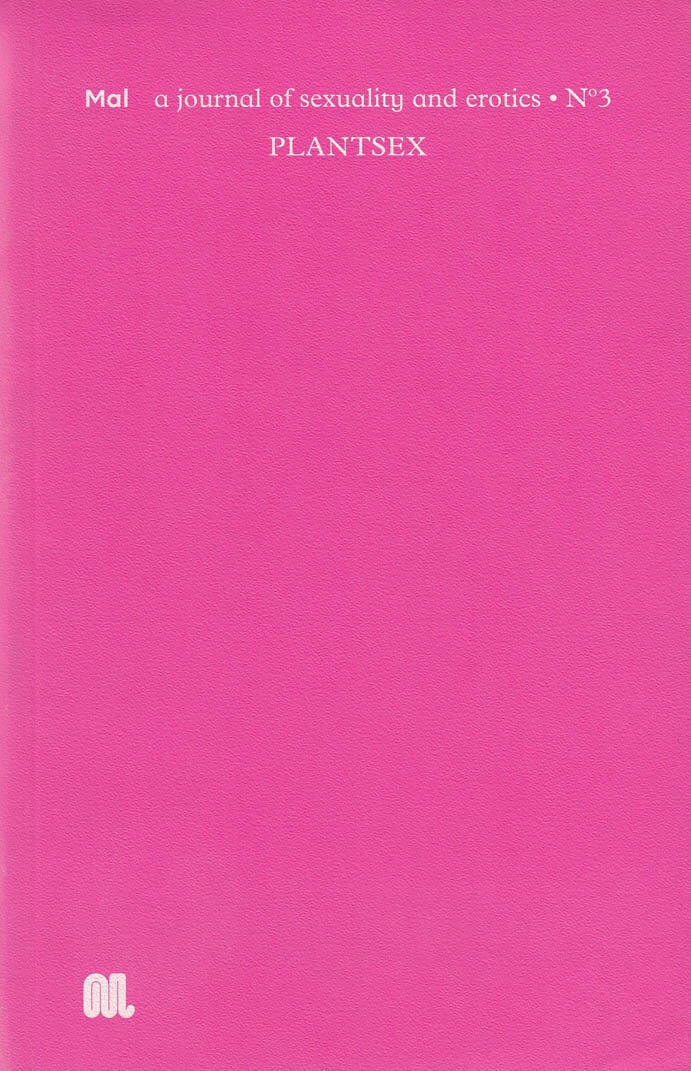
MAL, Nº 3: PLANTSEX
Kathryn Maris, Maria Dimitrova
On botany and eroticism in twelve essays, stories and poems. Published in collaboration with Serpentine Galleries.
First published: April 2019.
This issue of Mal Journal features an essay by Chloe Aridjis on Mexican flora and its foreigners, a sequence of poems by Bhanu Kapil, an essay on the sex lives of plants by Emanuele Coccia, a sci-fi story by artist Victoria Sin, a personal exploration of the queerness of gardening by Julia Bell, an essay on queer botanics by film critic Teresa Castro, a sequence of botanical nursery rhymes and artworks by artist, poet and gardener Alex Cecchetti, a new poem (and somatic poetry ritual) by CAConrad, an essay by writer and poet Daisy Lafarge asking ‘Can you be a revolutionary & still love flowers?’, excerpts from the Song of Songs and Ovid's Fasti V and Metamorphoses, and illustrations by Australian artist Yi Xiao Chen.
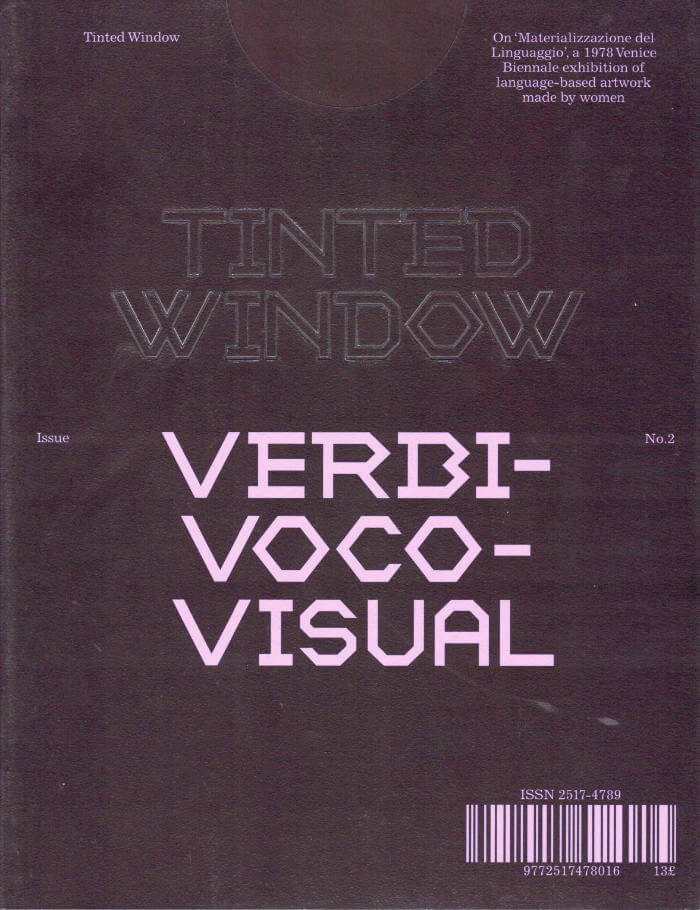
Tinted Window #2 : Verbivocovisual
This issue is dedicated to 'Materializzazione del Linguaggio', a 1978 Venice Biennale exhibition curated by Mirella Bentivoglio. The exhibition comprised of work by over eighty women artists working in a huge range of media, but united in their interrogation of text, voice and language. After the smashing hit of their Hervé Guibert No.1 issue, Tinted Window continues its focus on a single subject with issue No.2: Verbivocovisual. In No.2, Tinted Window brings much of this work back to the fore where many artists have slipped into the footnotes of an exciting period in art history. But much beyond our focus on this iconic exhibition, the issue features new essays and art projects by some of the best artists working with text, voice and poetry today.
No.2 features new commissions, translations and reprints from: Holly Antrum, Jeremy Atherton Lin, Mirella Bentivoglio, Angela Bianchini, Daniela Cascella, Anne Carson, Paula Claire, Paul Clinton, William Cobbing, Constance DeJong, Karen Di Franco, Sholto Dobie, Gustavo Grandal Montero, Katalin Ladik, Daisy Lafarge, Rosanna Mclaughlin, Silvia Mejía, Hannah Regal, Giovanna Sandri and Sue Tompkins.
